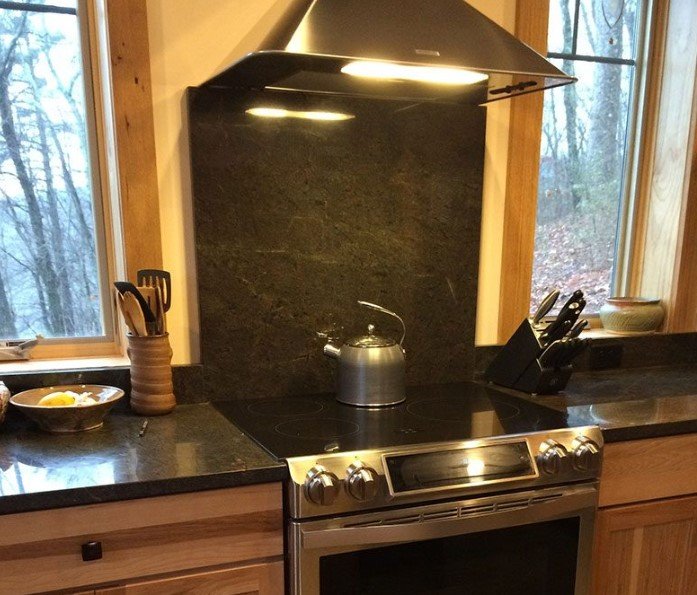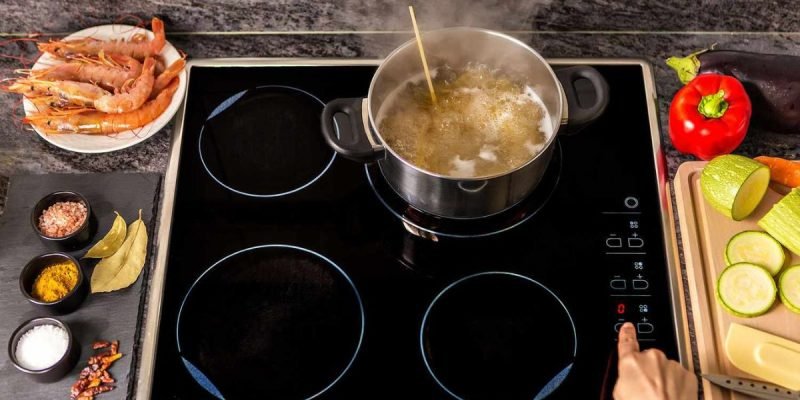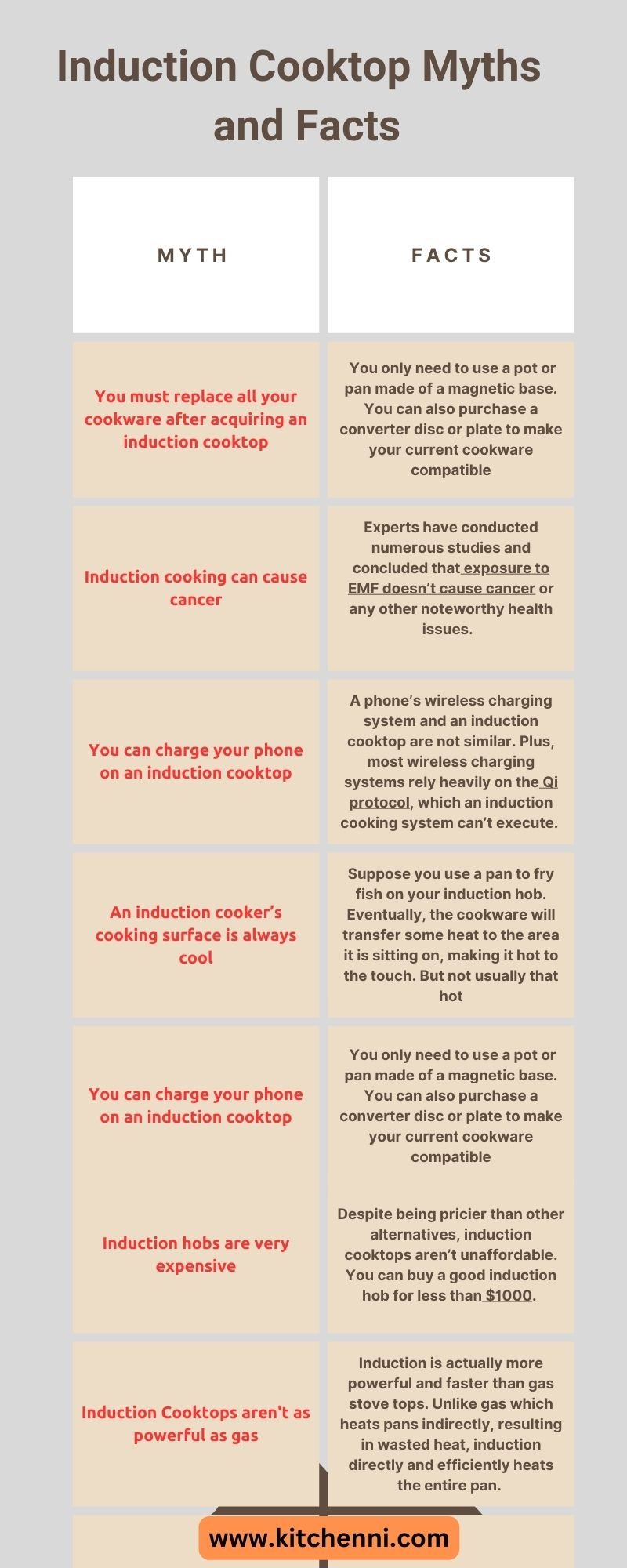Generally, no. While research is still underway to make induction cooktops safe for cooking, currently studies suggest that these electric cooktops are ideal for your home cooking.
Despite being widely adopted in Europe and Asia for decades, less than 5% of American households currently use induction ranges. One of the reasons for this low number is safety concerns.
The cool thing is that extensive research has demonstrated induction stoves have no negative impacts on human health when used properly.
We bust myths around radiation, EMFs, emissions, and other unfounded health fears over induction stove technology. We will also look at what science has shown so far about the health issues of induction cooking:
Looking for the best induction cooktops? We have a review for that so be sure to check our top picks.
Before we go deeper, check out common myths about induction cooktops in the infographic below:
Do Induction Cooktops Give Off Radiation?
First, let’s explain what radiation is and how it comes about before diving into whether induction cooktops give off radiation.
Radiations are electric fields that are created any time there is a voltage difference. The presence of a positive or negative electric charge gives rise to radiation. Electromagnetic frequencies are a type of radiation that arises from differences in electric current flows. This means that the higher the difference in electric current flows, the higher the electromagnetic frequency.
Therefore, it would be safe to state that EMFs are in abundance in the atmosphere as a by-product of many natural sources. The sun is the largest source of electromagnetic radiation. From the sun, harmful UV rays are dissipated into the human flesh.
As we narrow down, it is important to know that all electrical appliances (home and kitchen appliances) generate electromagnetic fields. This means that even your induction cooktop emits radiation. However, this should not be a cause for alarm as the radiation emitted is non-ionized. This means that there are very minute effects to this occurrence that can be managed by walking away from your induction unit and switching off your cooktop when not using.
Are there any Health Issues With Induction Cooking?
Is induction cooking safe for health? The provisions offered by induction cooktops surpass most that are offered by other heating options. Compared to gas and electric cooktops, Induction cooktops allow children and disabled persons to work on the unit safely.
However, the issue of using electromagnetic energy continually raises serious health questions. Therefore, it is not uncommon to bump into questions on whether induction cooking is safe for health? And whether there are any health issues due to smoke with Induction cooking. Read on as we expound more on this.
Induction cooktops indeed produce electoral waves. However, the waves produced are safe. Also, as we mentioned, the radiation that induction hobs have is usually at minimal levels, to the extent that it diminishes to nothing at short distances (say a few inches to about a foot) from the source.
Is Electromagnetic Induction Harmful?
Electromagnetic Induction is not harmful. However, there are many speculations around the issue after the International Agency for Research on Cancer (IARC) classified radiofrequency EMFs and extremely low-frequency magnetic fields as class 2b carcinogens.
This classification has, in turn, caused mayhem with a majority of kitchen appliance users boycotting the use of Induction cooktops.
Before we go any further, it is important to point out what class 2B carcinogen means. Simply put, the [2B] agent shows a close linkage of different mixtures to causing cancer in humans. This explains why electricity power lines have been closely linked to childhood leukemia and miscarriages.
However, this is very contradictory because some of the other class 2B substances such as coffee, aloe vera gel, and prickled vegetables are useful and sometimes basic in human consumption. In some instances, coffee has been said to reduce the rate of some cancer. This contradiction has disproved claims that EMF radiations such as those emitted by induction cooktops are harmful. To date, very few studies have been done on the effects of induction cooking devices on humans. This leaves no conclusive evidence on the dangers of induction cooktops or any other home technology to the human species.
Does Induction Cooker Cause Cancer?
To be more specific, there’s no enough evidence that suggests that induction cook tops can cause cancer. Yes, these devices use the technology of electromagnetic fields to heat the cookware, and which has been known to be carcinogenic. But the stovetops do not emit radiation levels that’s harmful to increase the risk of cancer.
Induction cooking has been approved by Food and Drug Administration (FDA) ad other agencies as generally safe. It’s, however, worthy to note that research is still being conducted to ascertain for a fact that induction cooking doesn’t have any direct correlation with cancer.
Just to be completely safe, ensure that you use your induction stove as per the manufacturers guidelines and safety recommendations.
What is the Most Reliable Induction Range?
The internet can sometimes be very confusing and misleading. The lack of concrete information on EMFs leaves a huge room for internet users to instill fear against the use of certain products within our environments. Induction cooktops have not been spared too.
As previously stated, the amount of radiation emitted by Induction units is very minimal. The range is minimal, given that the emissions are non-ionized. For safety reasons, make sure you avoid close contact with your induction cooker. You can keep a safe distance of around 30 cm away from your induction cooker. You should also ensure that your cookware sits comfortably on the cooktop to minimize the possibility of radiation straying away from the cooktop.
However, to do away with doubts and uncertainties, it would not hurt to measure the range of radiation within your settings. To do so, you can use an EMI Magnetic Field Detector. Although the product comes at a high price, it offers accurate home testing features. We hope that the product results will put your mind at ease and help you come up with ways to minimize radiation exposure.
Do Induction Cooktops Need to be Vented?

It is important to use your induction cooktop in a well-ventilated space. Whenever you cook, whether using an induction cooktop or an alternative cooking unit, you are bound to be exposed to steam, heat, and sometimes smoke. These are all products of the cooking process. However, these products can be choking or, in severe cases, suffocating. It is, therefore, important to let air in to get rid of those smells. Air movement is also believed to make cooking safer.
Induction cooktops do not need much venting when compared to gas or electric cooktops. This makes ventilator hoods a perfect choice for air purification techniques. This technology comes with inbuilt fans that move the air, and filters trap grease and dust particles. As a result, you end up working in a fresh, healthy kitchen.
Ventilators can come in different packages. You can have an Under-cabinet hood downdraft ventilation or a hood mounted onto your wall. There are also free-hanging hoods that are typically mounted on the ceiling. Whatever ventilation option you settle on, make sure;
- It is not noisy
- It offers good direct overhead lighting
- It has an adjustable lighting
- It is affordable
- It is safe, and you will feel comfortable having it in your cooking space
- It is stylish and aesthetic
What Factors Should You Look Out for When Choosing an Induction Cooktop?
Below are some of the factors that play a crucial role when one is buying an induction unit.
Size: The size of your cooktop lies squarely on how often you will be using your unit and for what purpose. The kitchen and counter space are other factors that determine the size of your induction unit. A clear knowledge of these factors will guide you to a suitably sized Induction cooktop
Cost: Your cooktop’s price is directly related to its size and the features it comes with. You should always accommodate long-term energy costs in your purchase budget
Durability: It is important to settle for well-performing induction cooktops made of quality, strong, and trusted brands. In your research, pay attention to product reviews as they may guide you to a fantastic induction cooktop option
Ease of Cleaning: Induction and Smooth-topped cooktops are gradually gaining popularity due to their ease of cleaning. Induction cooktops have smooth surfaces that make it easier for you to wipe spills when they fall on the unit before they burn or pile up. It is important to consider induction cooktops that come with cleaning manuals to help you take care of the unit.
Ventilation: Always be on the lookout for units that come with workable and affordable ventilation options. While at it, settle on induction cooktops that can easily be installed and repaired in case of damages
Others: You should also consider the safety features that come attached to your induction unit. This could be in the form of extra features that add convenience and functionality to your unit. Other advanced features to look out for include: Warming Zones settings, control lockout, cooking modules, and power boil burners
What are the Advantages of Using an Induction Cooktop?
Induction stoves are more energy efficient—and they cook food faster. Those are just some of the benefits. pic.twitter.com/ziFN6c6E8A
— NOVA | PBS (@novapbs) October 17, 2023
We like most Induction cooktops because they are fast, simple to clean, safe, and very efficient. Induction cooktops are particularly impressive in how they save electricity and make the whole cooking affair very exciting. The excitement is amplified by the cooktop’s ease of use and spectacular designs. It is breathtaking how seamlessly Induction cooktops blend with kitchen interiors. This technology has, by far, changed the kitchen’s look and experience.
What are the Disadvantages of an Induction Cooker?
The striking drawback of using an induction cooktop is that it is very pricy. Granted, it will cost you more to buy an induction cooktop than it would purchase a traditional electric or gas. This extra charge is brought about by the unit’s advanced features and the need for specific cookware. Using an Induction cooktop calls for an entirely new set of ferrous pots and pans.
Power dependency is another issue you will face when using an Induction cooktop. Unlike gas cooktops, an induction cooktop will only function when connected to electricity. This means that you may not cook if you experience a power outage.
Another aspect that may prove challenging when using an Induction cooktop is wattage requirements. Different Induction cooktop sizes and designs call for different wattage consumption. Therefore, you must be very keen to know how much wattage your induction cooktop offers you, more so if your unit is more than two burners. Take a scenario where your unit’s total wattage is 1800. This means that you will be using half of the total wattage (900) if you simultaneously use both burners. As a result, your food may take longer to cook, and this, in turn, means more electricity consumption.
The best wattage for an Induction Cooktop depends on the time used while cooking and the electricity used. The cooktops with 2100 watts,1900 watts, or 1200-wattage ratings are incredibly great for regular use
How Does Induction Work?
Induction cooking is widely applauded for fast heating as well as precision in achieving exact temperatures. An induction cooktop cooks food by directly inducing a resistive electric current in the cooking vessels causing all of the heat to be used for cooking.
Induction cooking is a type of electric cooking that uses magnetic coils to heat cookware sitting atop the induction unit. The coil itself does not get hot. This method of heat dissipation makes food cook fast and more evenly. The method also retains most of the food’s flavors and texture. Induction cooktops are often used in commercial kitchens, but that has not stopped them from being used in home kitchens.
How Does Electromagnetism Occur in Induction Cooktops?
An electric current goes through the magnetic coil once the power supply is switched on. The current is then distributed in all directions, and its effects are only felt after you place compatible cookware, preferably from ferrous material on the cooktop. The fluctuating magnetic field between the induction coil and the top of the cooktop enables heat energy transfers. This mode of energy transfer heats food through convection and conduction.
Are electromagnetic fields harmful? There is no definitive answer as to whether the electromagnetic fields created by an induction cooktop are dangerous to humans. It is, however, possible to limit your exposure to Electromagnetic fields. To reduce EMF’s potential risk, make sure you use the appropriate size and type of cookware on your induction unit. On the same note, it is preferable to use non-metallic cookware. You should also keep a safe distance of at least two to four inches away from the cooking surface.
Common Questions
Are induction cooktops safe for people with pacemakers?
Yes, induction stoves are safe for wearers of cardiac devices like pacemakers since no concerning fields are emitted outside the cookware itself during operation.
Do induction stoves emit any harmful fumes?
Induction ranges produce no direct exhaust or emissions since they don’t utilize flames. Surface temperatures stay cool, preventing residual fumes from overheated materials.
Can induction cooking impact my A1C levels?
No known direct correlation exists. But induction’s speed and ease can make preparing healthy meals quick and convenient, which aids overall nutrition and blood sugar management.
Should pregnant women avoid using induction cooktops?
No, induction stoves are considered safe for expectant mothers when used according to the manufacturer’s instructions, just like traditional ranges.



